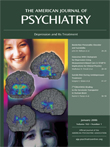Dr. Tieman and Colleagues Reply
To the Editor: In his letter, Dr. Goldney presents results of an Australian study in which he and his colleagues found no differences in psychiatric symptom profiles between adoptees and nonadoptees in adolescence (his reference 2). However, contrary to the results of the Australian study, we found that more adoptees (29.6%) than nonadoptees (21.6%) had a psychiatric disorder in adulthood. Our study is one of the few that investigated the mental health problems of adoptees in adulthood. There are a number of studies that reported on the adjustment of adoptees in adolescence. The results of our study corroborate the results of studies in which adoptees had more mental health problems than nonadoptees in adolescence, as reported in two reviews (1, 2). Despite the higher level of psychiatric morbidity that we reported for adult adoptees compared to that for nonadopted individuals from the general population, it is equally true that the majority of the adoptees had no serious mental health problems, although many of them had adverse early experiences. Therefore, we agree with Dr. Goldney that many intercountry adoptions result in good outcomes for many adoptees. To what extent this is due to the care with which intercountry adoptions are undertaken or to the individuals’ resiliency cannot be concluded from our data. We are currently studying the outcomes of international adoptees in their social functioning, including their education, work, and relationships.
1. Bimmel N, Juffer F, van Ijzendoorn MH, Bakermans-Kranenburg MJ: Problem behavior of internationally adopted adolescents: a review and meta-analysis. Harv Rev Psychiatry 2003; 11:64–77Medline, Google Scholar
2. Fensbo C: Mental and behavioural outcome of inter-ethnic adoptees: a review of literature. Eur Child Adolesc Psychiatry 2004; 13:55–63Crossref, Medline, Google Scholar



